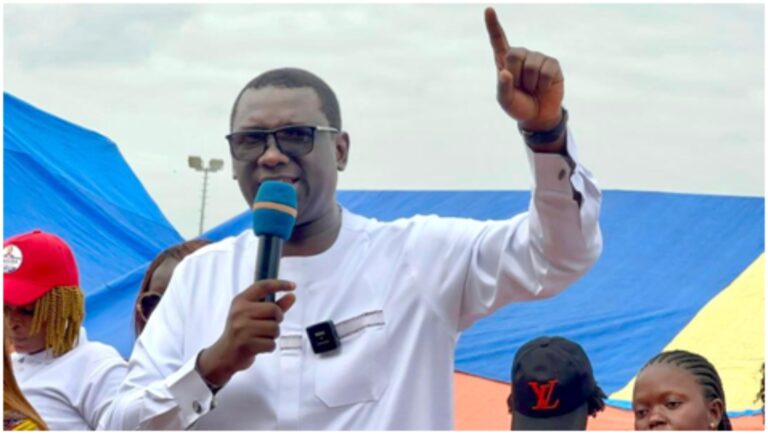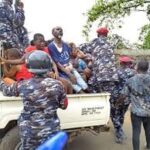By Alpha Amadu Jalloh
Author of “Monopoly of Happiness: Unveiling Sierra Leone’s Social Imbalance”
Recipient of the Africa Renaissance Leadership Award
In the remote borderlands of Sierra Leone’s eastern region, nestled along the Makona River in the Kissi Teng Chiefdom, lies a village that has become the symbol of a quiet but dangerous standoff: Yenga. Though officially part of Sierra Leone, Yenga has been under unlawful occupation by Guinean forces for over two decades. Despite peace, despite agreements, despite diplomacy the Guinean military remains entrenched, and the sovereignty of Sierra Leone is trampled with stunning impunity.
Yenga is not just a piece of land, it is a symbol of how weak states lose territory when international institutions fail, and leadership lacks courage. Guinea’s actions represent a creeping annexation, a 21st-century land grab executed not with declarations of war but with boots on the ground and bulldozers building permanent structures.
Even more alarming is the indifference of the African Union, ECOWAS, the Mano River Union, and the United Nations, which have done next to nothing in the face of this blatant violation of international law. The inaction of these bodies raises serious questions about the future of diplomacy, regional integration, and African solidarity.
The Yenga dispute began in 2001 during the climax of the Sierra Leonean civil war. At the time, Guinean soldiers were invited into Sierra Leone to support the fight against the Revolutionary United Front (RUF), particularly in the border areas where the rebels had taken control.
Yenga was one of those strategic entry points. Guinea’s presence in the area was justified as mutual defence cooperation, but what was meant to be temporary became permanent. After the war ended in 2002, and the rebels were disarmed, the Guinean forces did not leave. Instead, they solidified their hold on the area, much to the shock and dismay of local Sierra Leoneans and authorities.
Several bilateral efforts were made to resolve the issue:
2002 Rabat Agreement: Signed by Presidents Ahmad Tejan Kabbah (Sierra Leone) and Lansana Conté (Guinea), affirming that Yenga was Sierra Leonean territory, and that Guinea would withdraw.
Joint Boundary Demarcation Commission (2005): Intended to provide technical boundary confirmation. It stalled due to lack of political will.
2021 Joint Statement between Presidents Julius Maada Bio and Alpha Condé: Reiterated that “Yenga is not in dispute”, yet the Guinean military never left.
Despite these agreements, Guinea has instead increased its footprint, erecting permanent buildings, checkpoints, and military infrastructure.
A Weak Government Invites Aggression The most glaring factor in this lingering crisis is the timid and ineffective response of the Sierra Leonean government. Successive administrations have failed to confront Guinea decisively, relying instead on vague diplomatic reassurances while the situation on the ground worsens.
President Julius Maada Bio’s administration has on paper, stated its commitment to resolving the matter, but there has been no meaningful pushback. No national outcry. No legal recourse pursued. No calls for international arbitration. Instead, we get polite press releases and staged handshakes with Guinean leaders, while our people in Yenga live under foreign troops.
What has emboldened Guinea is not just its military might, it is Sierra Leone’s political weakness. Weakness that allows Guinean soldiers to intimidate civilians, seize farmland, and even force residents to use Guinean francs for daily transactions. Imagine paying for bread in foreign currency, on your own land. This isn’t just occupation; it is economic colonization.
A Continental and Global Silence That Screams Complicity. What has the African Union done about this? Absolutely nothing. The AU has sent no investigative mission. It has passed no resolutions. It has raised no concerns. Its much-touted Peace and Security Council remains mute, even as the sovereignty of a member state is undermined.
The United Nations, too, has been glaringly absent. This is particularly disturbing given that UNAMSIL, the UN Mission in Sierra Leone, once had a robust presence here during post-war recovery. But now, as Sierra Leone faces territorial violation, the UN has left us to fend for ourselves.
The International Court of Justice, the African Court on Human and Peoples’ Rights, and the Economic Community of West African States (ECOWAS) have also failed to step in. If international justice only applies to countries with oil, large populations, or geopolitical leverage, then small countries like Sierra Leone will continue to be abused with impunity.
The Doumbouya Factor: Domestic Politics, Military Optics. Some analysts believe that Colonel Mamady Doumbouya, Guinea’s military ruler, is using Yenga as part of his strategy to project strength to domestic constituents. Having seized power in a 2021 coup, Doumbouya faces pressure to transition to civilian rule through elections.
By asserting control over Yenga, Doumbouya sends a message of defiance and military superiority, not just to Sierra Leone but to his political opponents at home. He is using foreign territory to burnish his nationalist credentials and consolidate power.
But this is not just political theatre, it is dangerous. It risks igniting broader regional tensions, undermines trust between neighbours, and turns the Mano River region into a hotspot of unresolved disputes.
The Human Cost: Fear, Humiliation, and Displacement. For the people of Yenga and the surrounding Kissi Teng Chiefdom, the consequences are heartbreaking. They live in fear of soldiers who are not their own. They face daily intimidation, surveillance, and harassment. Many have abandoned farms due to fear of arrest or assault.
Local chiefs have reported threats, including confiscation of goods and interference with traditional leadership. Young people have fled to other parts of Sierra Leone, creating a slow but painful displacement.
What future do these citizens have if the government cannot defend their basic rights?
Even worse, residents are forced to transact in Guinean francs, eroding their economic sovereignty. Markets are controlled by Guinean authorities, border crossings are militarized, and Sierra Leonean laws are rendered meaningless in a village that is officially part of our map.
What Is the Endgame? A Roadmap Forward
Sierra Leone cannot continue pretending this is a minor issue. Yenga must become a top national priority. The longer this festers, the more dangerous it becomes.
Here’s what needs to be done:
Assert National Sovereignty Immediately: Parliament must pass a resolution reaffirming Sierra Leone’s ownership of Yenga and mandate the government to act decisively.
Recall the 2002 and 2021 Agreements: Re-publish the texts, document violations by Guinea, and present them to international bodies.
Formally Petition the UN and AU: Demand immediate intervention, including the deployment of peace monitors and mediators.
Initiate Legal Proceedings at the ICJ: The International Court of Justice must rule on the matter, using colonial boundaries and prior agreements as reference.
Mobilize ECOWAS and the MRU: These regional organizations must facilitate emergency summits to discuss the crisis and implement sanctions if Guinea continues its defiance.
Support Civil Society and Local Leaders: Establish a Border Rights Monitoring Commission with chiefs, journalists, and NGOs to document abuses and liaise with national institutions.
Engage the Media and the Diaspora: This issue must be internationalized. Our diaspora, especially in the United States and Europe, must raise awareness through advocacy, protests, and media campaigns.
The Time for Silence Is Over. Yenga is not a footnote. It is a frontline. A frontline for sovereignty, dignity, and national identity. We are either a country that protects all its land and people, or one that offers its territory to the highest bidder, the strongest army, or the loudest neighbours.
Guinea’s actions are deliberate, unlawful, and rooted in the arrogant belief that military power overrides diplomacy and legality. But the real tragedy is that Sierra Leone’s silence has been louder than Guinea’s aggression.
We must rise, not just for Yenga, but for every inch of Sierra Leonean land and every citizen who deserves protection, respect, and freedom.
The time to act is now. Yenga is ours. Let us prove it, not in words, but in action.







Cities’ message to world leaders: Unlock direct climate finance for Africa’s urban future